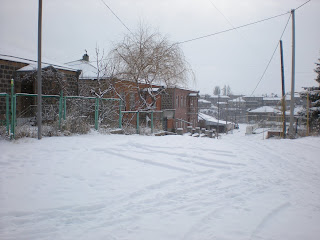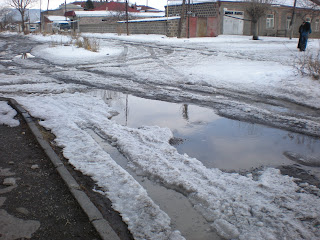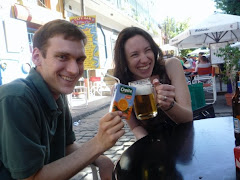
Although we were warned before coming to Akhalkalaki (and subsequently by locals upon arriving) that winters here were nothing to sneeze at, we’ve ended up with a pretty mild run by local standards. We didn’t really get any real snow to speak of (other than a few early dustings and one or two real coverings) until New Year’s Eve, when the world finally turned white. According to most folks, the weather was milder this year in honor of our presence, not wanting to scare us off too quickly. Usually, they assure us, there’s snow on the ground in October, or at least by November, and it lasts until May, sometimes even until June! These stories could be fish tales, but everyone has been adamant that this year has been unusually warm and snowless, something we’re inclined to believe.

Since our New Year’s white stuff, though, we’ve had a pretty consistent covering of snow and ice every day. We usually get snow at least about every other day. It comes about 2-3 inches at a time, just enough to make running a challenge (it’s not as much fun when it comes up over the edge of my shoes), and just enough to make everything seem peaceful and beautiful and clean and calm again, if only for a little while.
Sometimes we get a peek of blue sky through the snow clouds

Our street after a snow

The stadium has become pretty un-runable lately, but sure does look pretty

Lots of people here say that because of the elevation (remember, we’re about a mile and a quarter up), the sun is a lot stronger than it is at lower elevations. I don’t know about this explanation from a scientific standpoint (any of you sciency folks care to weigh in in the comments?), but we definitely do get some bright, strong sun. So in between our bouts of snow, we have full blast rays that, even if the temperature seems too low to allow melting, thaw all our pretty snow and create a lot of ice (as soon as it melts, it freezes again). We’ve had a few days when the temperature is slightly above freezing for a few midday hours, but as soon as the soon starts to go down, the temps drop and we get messes of slick ice all over. When it snows again, our 2-3 new inches help make the ice more navigable, but can also play a real number on an unsuspecting walker, who doesn’t realize the ice beneath. One of the teachers at my school apparently fell victim this week, slipping on the ice outside our school, falling and breaking her arm.
This past week we really thought spring might be on its way, though. We had so much sun and got above freezing several days in a row without any additional snow. You might be thinking this sounds lovely, but in fact it had us wishing for another drop in the mercury. See, snow removal in Akhalkalaki (and much of the rest of Georgia, from what I’ve seen and heard), is virtually nonexistent. No, that’s not fair to say. Mostly, snow removal strategies here center on gravity: eventually the snow will melt and roll downhill into the river. In the meantime, cars drive and slide through the streets, which progressively get higher and higher as the snow accumulates and gets packed down through pressure and melting-refreezing. This week we had full-on lakes in lots of the roads, mixtures of slush and dirty water that caused us to walk, jump and skip our ways across town, weaving like drunk people. More than once I’ve sung the praises of my waterproof boots after stepping onto what looked like solid snow, only to be a cruel trick of an ankle-deep puddle.
I remember when I was in St. Petersburg in the spring, watching the ice break up on the Neva River and in the canals, being struck by the idea of what the word “thaw” means in different languages. In Russian, the noun “thaw”—оттепель—comes from a combination that directly means “from warmth.” I like the sound of it better than the English word, that just makes me think of sticking frozen chicken breasts into the microwave.
Just as in Russia, watching the thaw in action here in Georgia makes more of an impression than thaws in the U.S. ever did. In addition, seeing melting here, watching a thaw, makes me feel like as an American learning about the thaw in U.S.-Soviet relations in history classes, I never fully understood or appreciated the symbolism behind the calling the period “the thaw.” I generally took it to mean that relations were icy and were slowly becoming warmer. Maybe even like the artificial heating of a frozen chunk of chicken in the microwave. It didn’t really have an impact on me, talking about the thaw. Seeing a literal thaw in action, though, I’m struck by how much more apt the term is than I initially credited. You see the sheer force warmth has in breaking up the ice and changing the terrain, for sure. That in itself has an impact. But you also see downside of thaw: the dirt and the trash and the things lost or left behind that were suspended in the ice come to light again. In many ways, it’s much uglier than it was during the freeze, and people are just as likely to wish the thaw to turn back into freezing as they are to wish it further along. Also, as was the case here in Akhalkalaki today, one period of thaw that looks sure to lead directly to the warmth of spring can be followed by another freeze and snow, the beautiful result of which canceled our run today.
Some streets in thaw this week



Last night’s and this morning’s snow has solved our problems for today of getting through town without slipping or falling into puddles. And it has delayed, at least for a little while, the threat of spring and warmer days. It’s a bit of a relief that we’ll be able to walk to our Armenian lesson and across town on some errands today without dealing with quite so much slush. But the slush will return, the thaw will continue. In the cycles of weather and literal warming and freezing, you can always count on spring to follow winter. Before you know it we’ll be shedding our many layers of long underwear and sweaters for warmer wear, whether in March, April, May, or god help us, June.




the strength of the sun's UV rays increases as the elevation increases. =)
ReplyDelete